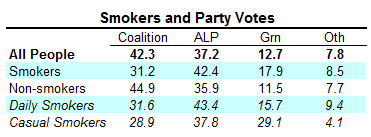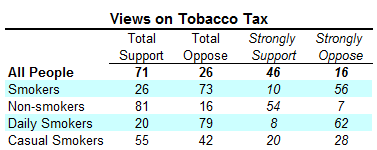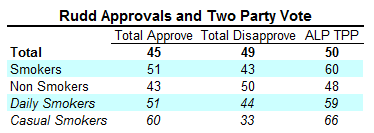When this week’s Nielsen poll was released in the Fairfax press on Monday, we mused over the possibility of smokers being a significant contributor to the latest bout of decline in the Labor vote. Fortuitously as it turns out (and I didn’t actually know this on Monday) Nielsen also asked a set of additional questions in this poll on the support for the tobacco tax increase and views on the Resource Super Profits Tax. These additional poll results were released into the Fairfax press on Tuesday.
What is handy about the results of the tobacco tax question is that they also asked about smoking incidence. For the first time, we have party vote breakdowns on smokers and non-smokers – as well as all sorts of other goodies that might help us explore the theory a little further.
To start with, Nielsen asked the following question:
I would like to ask you about smoking tobacco, including cigarettes, cigars, and pipes. Do you currently smoke tobacco on a daily basis, less than daily, or not at all?
The results with basic demographic cross-tabs come in like this – note that I’ve categorised respondents that answered “less than daily” as “casual smokers”
While 18% of the population smoke, it’s slightly higher in non-capital cities than capital cities, and slightly higher among men than women.
Next up, we can break this down into party vote, showing us the primary voting intention among the total population, smokers, non-smokers, daily smokers and a small sample estimate of casual smokers (containing quite a lot of uncertainty because of the small sub-sample size)
What we see is that the ALP primary vote was 37.2% among all people, but 42.4% among smokers – rising a tad to 43.4 among daily smokers.
It has long been suggested that the ALP has a larger proportion of smokers than the Coalition – just because of the socioeconomic distribution of Labor voters alone (people on low incomes are more likely to smoke than people on high incomes, young people are more likely to smoke than older people etc) – and this poll solid evidence to support that.
Nielsen also asked an additional question on the increase in tobacco tax excise:
The Government has increased tobacco excise by 25%. Do you support or oppose this increase in tobacco tax? Is that strongly support / support / oppose / strongly oppose?
The results, with relevant cross-tabs come in like this:
While there was strong support among the total population (71%), it (unsurprisingly) reduced to a lowly 20% among daily smokers. Interesting too is that 62% of daily smokers strongly opposed the tax.
This all begs the question that we pondered earlier – did smokers add a percent or two to the drop in the ALP vote over the last polling cycle?
In one respect, the potential was certainly there. If we look at the proportion of each party’s vote that are smokers/ non-smokers, we find:
21% of people that said they would give the ALP their first preference last weekend were smokers – far higher than the proportion of Coalition voters that smoke. So the potential was there for a bit of movement against Rudd from smokers delivering an additional point or so or movement.
But the results also contain some mixed results. If we look at Rudd’s approval rating and TPP vote for the relevant cohorts, we get:
Interesting here is that in two party preferred terms, smokers vote 60/40 for Labor. However, despite introducing a tax that 68% of daily smokers strongly disagreed with, daily smokers still have a much higher approval rating for Rudd than his all-population average.
We can’t tell from a single, after the event poll if smokers added a little extra to the drop in Labor’s vote estimates over the last polling cycle – yet on the one hand, most smokers were strongly opposed to the tax, but on the other hand, smokers still support Rudd strongly.
In fact, if we look at the ratios of the primary or two party preferred vote to the approval ratings of Rudd for each cohort – they’re all about the same, suggesting that the approval rating for Rudd among smokers is about what we would expect considering the primary vote level he’s getting from them. Smokers might disagree strongly with the tax, but their approval rating for Rudd as a cohort doesn’t appear to be unusually low (or unusual at all for that matter) – there doesn’t appear to be any strong effect of smokers disapproving of Rudd but still voting for him.
If there was a block of smokers that moved, it would appear that they changed their vote and their disapproval at the same time, without any wider outbreak of PM disapproval occurring amongst the smoking classes.
That said, this is the first time I’ve seen polling using smokers as a cohort – so a big thanks to Nielsen! I’ve got all sorts of cross-tabs here on this that haven’t been posted, so if you have any questions, feel free to throw them around.












Crikey is committed to hosting lively discussions. Help us keep the conversation useful, interesting and welcoming. We aim to publish comments quickly in the interest of promoting robust conversation, but we’re a small team and we deploy filters to protect against legal risk. Occasionally your comment may be held up while we review, but we’re working as fast as we can to keep the conversation rolling.
The Crikey comment section is members-only content. Please subscribe to leave a comment.
The Crikey comment section is members-only content. Please login to leave a comment.